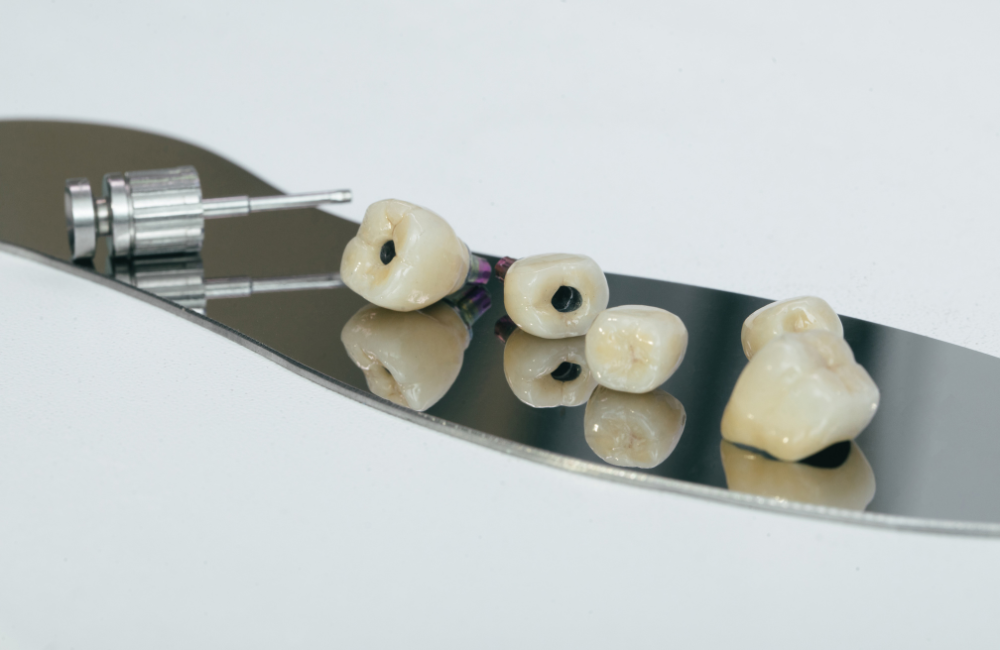Is It Better to Get a Dental Crown or Remove the Tooth?

If you’ve got a decayed or damaged tooth, deciding between removing the tooth or getting a dental crown is a common but important decision.
This choice involves considering the extent of the damage, long-term effects and your preference.
This article will discuss what a dental crown is, what tooth removal is, the benefits of both procedures and determine which choice is better for you.
What is a Dental Crown?
A dental crown, often called a “cap“, is a type of dental restoration individually crafted to cover your natural tooth completely.
Common reasons for getting a dental crown are for aesthetic purposes or to reinforce the strength of a tooth.
Dental crowns are a common solution for those with decayed, damaged or discoloured teeth.
Getting a dental crown involves many steps, such as:
- Examination: Your dentist will look at the affected tooth and decide if a crown is necessary and, if so, what type of crown will suit your needs best.
- Tooth preparation: Your dentist will then prepare your tooth by removing any decay or damage, removing enamel and shaping the remaining tooth.
- Impressions: The next step is to take impressions of your tooth to create a mould for your dental crown. Admire Dentistry uses a digital scan which makes the whole impression process far more comfortable.
- Temporary crown: While your new crown is being prepared, your dentist will place a temporary crown on the tooth to protect it until your final crown is ready.
- Crown placement: once your final crown is ready, your dentist will remove the temporary crown and secure your final crown with dental cement.
During the examination stage, your dentist will determine which crown is right for you. There is a range of options for crowns, including
- Metal crowns: These types of crowns are great for molars as they rarely chip or break, prolonging the life of the tooth. Metal crowns also require only a small amount of enamel removal. Quality metal crowns at Admire Dentistry are created with a high percentage of gold.
- Porcelain-fused-to-metal crowns: These types of crowns are suitable for any teeth, especially the ones at the front, as your dentist can colour-match them with the rest of your teeth. These crowns last long and look great due to the combination of metal and porcelain.
- Pressed ceramic crowns: These types are similar to porcelain-fused-to-metal crowns, but the core is usually a zirconia material instead of metal. Pressed ceramic crowns are commonly used on both front and back teeth, and they have good aesthetics.
- All-porcelain or ceramic crowns: These types are great if you have metal allergies. They also mimic the appearance of tooth enamel more than any other type of dental crown. These types of crowns are typically made with zirconia, porcelain, and eMax.
Benefits of dental crowns
The most common benefit of getting a dental crown is that it can prolong the life of your natural tooth.
However, there are many other benefits, including
- Strengthening a weakened tooth
- Protecting and supporting a cracked tooth
- Restoring a worn-down or broken tooth
- Covering a root canal-treated tooth
- Holding a dental bridge in place
- Covering a stained or discoloured tooth for aesthetics
Who is suitable for a dental crown?
So, how do you know if a dental crown is right for you?
If you have any of the following, a dental crown might be the right choice for you:
- A severely damaged or broken tooth due to decay
- An infected, cracked or misshapen tooth
- A misshapen tooth due to root canal treatment
- A severely discoloured tooth or teeth
- Broken cusps
While you may have a broken tooth, broken cusps or even a misshapen tooth, your dentist will first have to examine your tooth to determine if you’re suitable for a dental crown.
If you’re not suitable, don’t worry, as there is another solution.

What is Tooth and Wisdom Tooth Removal?
Unlike dental crowns used to prolong the life of your teeth, if you have a tooth that is severely damaged or decayed, it may need to be removed.
Tooth extraction is when a tooth is removed from its socket in the gum tissue and jawbone.
There are two main types of tooth extractions:
- Simple: A simple tooth extraction is performed on visible teeth easily accessed by your dentist or oral surgeon. The tooth is loosened and then removed from the socket. A simple extraction usually takes place in the dental clinic under local anaesthetic.
- Surgical: These types of extractions are much more complicated and are required for teeth that may be impacted or hard to access. Your dentist or oral surgeon may need to make an incision in the gum tissue and remove the bone around the tooth before extracting the tooth. These extractions are typically carried out under general anaesthetic.
You may need to have a tooth removed if you have:
- Bad gum disease
- Severe tooth decay
- A deep infection
- A broken tooth
- Overcrowded teeth
- Problems with a wisdom tooth
- Trauma affecting a tooth or teeth
Tooth extraction or wisdom tooth extraction is typically a last resort when other dental treatments, such as root canal therapy and dental crowns, cannot preserve the tooth’s function or health.
Benefits of tooth or wisdom tooth extraction
Whether it’s a regular tooth or a wisdom tooth, tooth extraction has several benefits, including:
- Pain relief: If you have a damaged or decayed tooth, it can lead to a lot of pain. Toothache can be very severe and often interferes with your daily activities, making it difficult to enjoy life. However, tooth extraction provides an almost immediate relief from pain. Tooth extraction does remove the source of the pain immediately; however, keep in mind that pain during the healing process can be different for everyone.
- Lower risk of problems in the future: In some cases, especially when it comes to wisdom teeth, tooth extraction is taken as a precautionary measure. Wisdom teeth, also known as the third molars, are commonly extracted due to insufficient space in the mouth. Removing wisdom teeth prevents them from pushing other teeth out of alignment, avoiding TMJ disorder and many other issues.
- Removing the source of infection: If the innermost layer of your tooth (pulp) gets infected, root canal therapy is a common solution to remove the infected tissue and prevent extraction. However, if the infection is too severe, tooth extraction may be the best solution to remove the infection and prevent it from spreading to other parts of your mouth.
- Preparing for orthodontic treatment: In some cases, you may need to have a perfectly healthy tooth removed. This can happen when your dentist prepares you for braces to create space for teeth to be correctly aligned and improve your overall bite.
Who is suitable for tooth removal?
As mentioned earlier, tooth extraction is a last resort when other dental treatments cannot preserve the tooth’s function or health. However, tooth extraction may be needed to make room for overcrowded teeth to be correctly aligned.
The most common candidates for tooth extraction are those with:
- Severely damaged or decayed teeth
- An infection or abscess
- Impacted wisdom teeth
- Overcrowded teeth
- Periodontal (gum) disease
- Fractured teeth
Dental Crown or Tooth Removal: Which is Better for You?
So, now that you know the difference between dental crowns and tooth extraction, which is better for you?
It all depends on a range of factors, including:
- The condition of the tooth: If your tooth is severely decayed or damaged, your dentist will remove it rather than cap it.
- Surrounding teeth: If the surrounding teeth are weak or are in poor oral health, a dental crown would be the better choice to avoid damaging the adjacent teeth during extraction.
- The tooth’s location: If your tooth is in a difficult-to-reach location, it may be too hard to put a crown on it. Therefore, extracting the tooth may be the better option.
Get a Dental Crown or Tooth Extraction at Admire Dentistry

Your dental health is important, which is why choosing between getting a dental crown or tooth extraction is also important.
At Admire Dentistry, our talented and experienced dentists are here to make the choice as easy as possible for you.
We understand that everyone’s dental needs are different, so you can have peace of mind knowing we’ll do a thorough examination to provide you with the best possible solution for your oral health.
Whether you’ve got a damaged tooth that needs a crown or a severely decayed tooth that needs to be removed, we’ve got you covered.
If you’ve got a tooth that needs tending, book an appointment with the dentist Samford Village residents trust. We’re ready to help you make your smile the best it can be.




